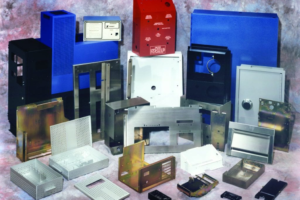 Sheet metal fabrication is the process of turning sheet metal into functional parts using a variety of different processes. Because of the customizability, durability, and cost-effectiveness of fabricated parts, sheet metal fabrication is essential to nearly every industry.
Sheet metal fabrication is the process of turning sheet metal into functional parts using a variety of different processes. Because of the customizability, durability, and cost-effectiveness of fabricated parts, sheet metal fabrication is essential to nearly every industry.
Lansco Manufacturing has fabricated high-quality sheet metal parts since 1986. From small precision components to complete factory automation, we have the experience to produce fabricated metal parts that suit your needs. We can assist you through the design, prototyping and production phases of your projects.
What Is Sheet Metal Fabrication?
Sheet metal fabrication encompasses many different methods of transforming sheet metal into usable metal components. Different types of metal can be used in the process to meet your needs. Some common sheet metals used include steel, stainless steel, aluminum, bronze, and copper, all with their own unique benefits.
Sheet Metal Fabrication Techniques
Common sheet metal fabrication techniques include:
- Cutting. Cutting is the initial operation in sheet metal fabrication. It can be done using a variety of methods including shearing, flame, plasma, laser and water jet cutting.
- Punching. During the punching process, sheet metal is placed between a die and a punch. The punch forces through the metal until it hits the die to create holes in the material.
- Stamping. Stamping is a cold-forming method that uses a punch, die, and shear pressure to turn flat metal blanks into various shapes.
- Forming. Sheet metal forming involves stretching sheet metal into a new shape rather than removing any material.
- Welding. Welding uses a combination of heat and pressure to join two or more pieces together into a single part.
- Bending. Bending is a sheet metal fabrication process that uses press brakes, rolling machines, and other equipment to bend sheets of metal.
- Deburring and Polishing. Removing burrs and sharp edges is critical for sheet metal components. Graining and polishing is often required to produce the desired appearance.
- Painting and Powder Coating. Custom finishes provide aesthetic and protective coatings for steel components.
Benefits of Custom Sheet Metal Fabrication
Sheet metal fabrication offers many benefits that make it popular across a range of industries and applications. Benefits include:
- Easy to transport. Sheet metal is light and has a low weight and gauge, making it easy to transport, handle, and install.
- Cost-effective. Sheet metal fabrication offers an affordable and efficient way to produce lightweight and high-quality products with little or no tooling investment.
- Has a wide variety of applications. Since fabricated sheet metal parts can be designed and produced to your specifications, you can create the exact parts you need using the appropriate metal materials.
- Accurate and durable. When combined with modern CNC technology, sheet metal fabrication can be extremely accurate. Sheet metal fabrication also offers parts with durable surfaces that can withstand a variety of environmental conditions.
- Allows for the salvaging of old equipment. If an old part is no longer being produced, instead of replacing the entire machine, you can get a new part custom-fabricated. Engineers can reverse engineer old parts and save you money in equipment replacement.
Applications and Industries
Sheet metal fabrication is essential to almost every industry because of its versatility and strength. Here are some major industries that rely on sheet metal fabrication:
- Aerospace. Sheet metal fabrication is used to produce parts and components for commercial aircraft, military aircraft, and spacecraft as well as ground support equipment.
- Energy. Sheet metal fabrication is used to create various components for the energy sector, including wind turbines, pipelines, transmission towers, and more.
- Mining. Mining operations rely on machinery and tools that are often created using sheet metal fabrication. Shovels, trucks, dragline excavators, and more rely on fabricated sheet metal parts.
- Architecture and construction. Sheet metal fabrication produces beams, supports, and sheets in the correct dimensions for various construction and architecture projects.
- Medical and Pharmaceutical. Medical instruments and equipment such as MRI machines, medical imaging equipment, and ultrasound machines rely on fabricated sheet metal parts. Sheet metal fabrication is especially useful in the medical industry where precision and durability are paramount.
- Food Processing and Packaging. Equipment such as slicers, grinders, washers, fillers, cappers, seamers, labelers, wrappers, and conveyors all use stainless sheet metal requiring sanitary grade welding and finishing.
- Transportation. Cars, trains, and other vehicles are made of many fabricated metal parts. For example, car frames use durable fabricated metal parts that are sturdy enough to support the weight of the car.
- Shipbuilding. Many ships require ladders, steel hulls, metal stairs, and other metal parts. This equipment is all produced with sheet metal fabrication.
Custom Sheet Metal Fabrication at Lansco Manufacturing
At Lansco Manufacturing, we offer custom sheet metal fabrication services to meet the needs of various industries. Sheet metal fabrication is essential to many businesses, and with our years of experience, we can help you design and produce the parts you need while saving you time and money. We can fabricate parts of virtually all sizes and quantities quickly and cost effectively. Contact us today or request a quote to get started on your custom sheet metal fabrication solution.
Comments are closed